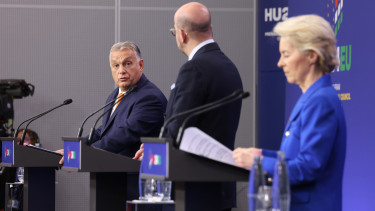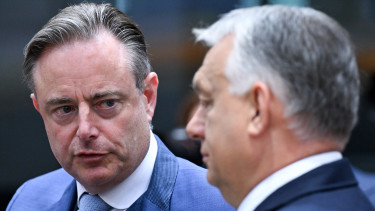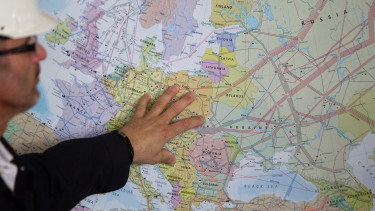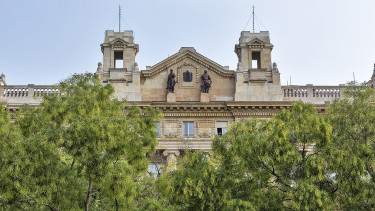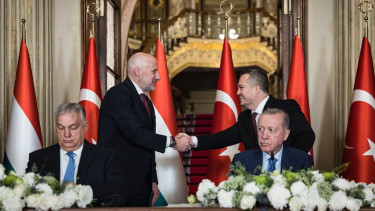EU funds
Co-ordinated EU raid at five Hungarian corporations
Index said EU inspectors showed up at the companies at the same time, confiscating electronic equipment and checking data storage devices. “They were looking for leads that suggest the companies in question were in collusion to divide the market between themselves."
One of these companies was Elios Zrt. where the European Anti-Fraud Agency (OLAF) concluded at the end of 2017 an investigation into possible irregularities related to 35 lighting projects (worth EUR 40 million) implemented under the Hungarian Environment and Energy Operational Programme, and co-financed by the European Cohesion Funds. At the time of the alleged irregularities, the company was co-owned by István Tiborcz, the son-in-law of Hungary’s Prime Minister Viktor Orbán.
While the Hungarian police closed the OLAF-triggered investigation, saying that no evidence was found that a crime had been committed, the European Commission did not give up looking into the case to determine whether Hungary will have to pay back funds to the EU.
As a response, Hungarian authorities simply recalled the disputed project invoices, as a result of which about HUF 13 billion spent in these projects had indeed been paid by Hungarian taxpayers instead of the EU.
This time, though, it is not the OLAF that is investigating, as the objective of the probe is different, the portal said. “The European Commission suspects that irrespective of the drawing of EU funds, companies that won public procurement tenders jointly with Elios Zrt. in the last ten years acted in breach of regulations."
If the suspicion is substantiated serious penalties can be expected, those that may reach up to 10% of the company’s revenues. It is about cartel charges: the companies in questions possibly agreed how to divided the market between themselves, they could have artificially prices their products and services.
Index reminded that during the Elios probe the OLAF uncovered the collusions between certain companies and municipalities so that Elios would win public procurements for lighting projects. The HUF 13 bn EU funding for these have been revoked in total.Theoretically, the current investigation does not directly affect EU subsidies, as on the basis of competition law the EU may launch probes in any significant case if it suspects that market could have been circumvented. Hungarian authorities have already conducted such investigation and found no irregularities, even though it was uncovered that Elios-linked Sistrade had helped prepare procurements from the state’s side, and that Tungsram-Schréder sold lamps to Elios at half the market price.
Index does not name the other four companies currently being investigated, but it suggested that between 2011 and 2015 Elios won one tender after another in co-operation with an extensive network of companies. Some of these appeared on the documents as a partner in a consortium, while others were “rivals" or sub-contractors. These likely include the four other companies now facing the EU proble.
One of these companies was Elios Zrt. where the European Anti-Fraud Agency (OLAF) concluded at the end of 2017 an investigation into possible irregularities related to 35 lighting projects (worth EUR 40 million) implemented under the Hungarian Environment and Energy Operational Programme, and co-financed by the European Cohesion Funds. At the time of the alleged irregularities, the company was co-owned by István Tiborcz, the son-in-law of Hungary’s Prime Minister Viktor Orbán.
While the Hungarian police closed the OLAF-triggered investigation, saying that no evidence was found that a crime had been committed, the European Commission did not give up looking into the case to determine whether Hungary will have to pay back funds to the EU.
As a response, Hungarian authorities simply recalled the disputed project invoices, as a result of which about HUF 13 billion spent in these projects had indeed been paid by Hungarian taxpayers instead of the EU.
This time, though, it is not the OLAF that is investigating, as the objective of the probe is different, the portal said. “The European Commission suspects that irrespective of the drawing of EU funds, companies that won public procurement tenders jointly with Elios Zrt. in the last ten years acted in breach of regulations."
If the suspicion is substantiated serious penalties can be expected, those that may reach up to 10% of the company’s revenues. It is about cartel charges: the companies in questions possibly agreed how to divided the market between themselves, they could have artificially prices their products and services.
Index reminded that during the Elios probe the OLAF uncovered the collusions between certain companies and municipalities so that Elios would win public procurements for lighting projects. The HUF 13 bn EU funding for these have been revoked in total.Theoretically, the current investigation does not directly affect EU subsidies, as on the basis of competition law the EU may launch probes in any significant case if it suspects that market could have been circumvented. Hungarian authorities have already conducted such investigation and found no irregularities, even though it was uncovered that Elios-linked Sistrade had helped prepare procurements from the state’s side, and that Tungsram-Schréder sold lamps to Elios at half the market price.
Index does not name the other four companies currently being investigated, but it suggested that between 2011 and 2015 Elios won one tender after another in co-operation with an extensive network of companies. Some of these appeared on the documents as a partner in a consortium, while others were “rivals" or sub-contractors. These likely include the four other companies now facing the EU proble.

This article is part of the work programme titled "The impacts of EU cohesion policy in Hungary - Present and Future" which is carried out by Net Média Zrt., the publisher of Portfolio.hu, between 1st April 2019 and 31st March 2020 with European Union financing. The views in this article solely reflect the opinions of the author. The European Commission as the funding entity does not take any responsibility for the use of information presented in this article.

